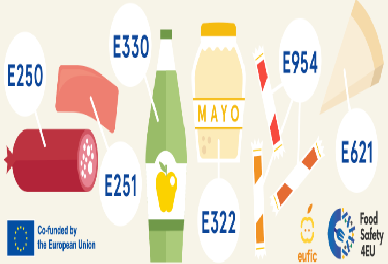What Are Food additives?
Food additives are chemicals added to foods to keep them fresh for longer or to improve their color, flavor, or texture. They are widely used in packaged and processed foods to enhance taste, appearance, and shelf life. While most additives are considered safe, a small percentage of people may experience sensitivity or adverse reactions.

Image Courtesy : eufic
Types of Food Additives :
Flavor enhancers, such as monosodium glutamate (MSG), are used to boost savory taste. However, some people report symptoms like headaches, flushing, or nausea after consuming foods containing MSG.
Food colorings—including tartrazine, sunset yellow, and cochineal—make products look more appealing but can trigger issues in sensitive individuals. They have been linked to allergic reactions, asthma symptoms, and even hyperactivity in certain children. For example, tartrazine, a commonly used yellow dye, may cause rashes or hives in some people.
Preservatives play a key role in preventing spoilage and extending shelf life, yet compounds like benzoates, nitrates, and sulphites can cause side effects. Sulphites, found in dried fruits, wines, and some packaged foods, may trigger asthma attacks. Nitrates and nitrites, often added to processed meats, are associated with headaches and have raised concerns about long-term health risks. Benzoates, commonly used in soft drinks and sauces, may worsen asthma symptoms or irritate the skin.
Artificial sweeteners, such as aspartame, are popular sugar substitutes but have been reported to cause headaches, dizziness, or mood changes in some individuals.
Reactions to food additives differ from person to person, and because the symptoms often mimic other health issues, pinpointing a true sensitivity can be challenging. Identifying the specific trigger usually requires professional guidance, often involving tools like food diaries, elimination diets, or supervised testing.
Here are some everyday foods that often contain lots of food additives:
-
Soft drinks and energy drinks – usually contain artificial colorings, flavorings, preservatives (like benzoates), and sometimes artificial sweeteners like aspartame.
-
Packaged ready-to-eat meals and fruit juices – may include added colors, flavor enhancers, and preservatives such as sulphites.
-
Processed meats (sausages, hot dogs, bacon, ham, salami) – often contain nitrates, nitrites, preservatives, and flavor enhancers.
-
Instant noodles and soups – commonly have MSG, flavor enhancers, colorings, and preservatives.
-
Breakfast cereals – many are fortified with colors, flavors, and preservatives to improve taste and shelf life.
-
Sauces and ketchup – often contain preservatives like benzoates, artificial colors, and flavor enhancers.
Even foods marketed as “healthy” (like flavored yogurts or diet sodas) may also contain artificial sweeteners, colors, and stabilizers.
The more processed and colorful the food, the higher the chance it contains multiple additives. Reading food labels can help you spot them quickly.
Smart Swaps: Choosing Fresh Foods Over Additives
| Junk Food | → | Swap With Healthy Choice |
| Cola / Soft drink | → | Lemon water / Coconut water |
| Instant noodles | → | Veggie soup / Whole wheat pasta |
| Ketchup & Sauces | → | Fresh tomato dip / Green chutney |
| Processed meats | → | Boiled chicken / Boiled eggs |
| Sugary cereals | → | Oats with fruits / Millet porridges |
| Flavored Ice Cream | → | Yogurt / Homemade kulfi |
Takeaway:
With the right support, people who are sensitive to food additives can learn to manage their diet and avoid problematic ingredients. Reading food labels carefully and choosing whole, minimally processed foods are practical ways to reduce exposure while still maintaining a balanced and enjoyable diet.
Medical Disclaimer :
This information is for educational purposes only and should not be used as a substitute for professional medical advice.
If you suspect any kind of troubles after consuming foods high in additives, consult a qualified healthcare provider for proper diagnosis and guidance. A doctor or dietitian can help determine your tolerance level, identify safe foods, and suggest appropriate treatments or dietary adjustments.
Read further on:
≺≺ How are artificial sweeteners made?
≺≺ What health problems are linked to consuming corn syrup?
≺≺ What food is most effective for moderating blood sugar?
≺≺ How Do Sugary Meals and Beverages Harm Dental Health?
≺≺ What Is the Ketogenic Diet? Is the Keto Diet Right for Everyone?
≺≺ What is the Okinawan diet? What is the secret behind Okinawan long life expectancy?
≺≺ EWG’s- The Clean Fifteen: Fruits and Vegetables with the Lowest Pesticide Levels.
≺≺ What are antioxidants? How antioxidants in the fruits and vegetables help in preventing cancers and diseases?
≺≺ What foods should people with high blood pressure avoid?
≺≺ How can I reduce the risk of cancer-causing chemicals when cooking or grilling meat?
≺≺ What happens to my blood vessels when I gain weight?
≺≺ What type of exercise is best for lowering my blood sugar?
≺≺ What impact can sitting for long periods have on my health?
≺≺ How toxic are the nitrites used in curing processed meats?
≺≺ What foods can lower prostate cancer risk?
≻≻ Watch this page for more such informative articles on Health, Nutrition, and Wellness.
≻≻-Back to Home page.
Further reading (External Links opens in new window):
≺≺- Better Health – Food Additives-Health Department, Victoria State Gov.
≺≺- eufic – Food Additives Campaign:

